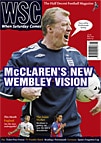 Justin McCurry examines the issues facing clubs looking to conquer the Japanese market
Justin McCurry examines the issues facing clubs looking to conquer the Japanese market
It is a measure of English football’s global reach that the American owner of an English club has plans for commercial expansion in Asia. His description of Liverpool as a “franchise” might have upset traditionalists, but George Gillett’s enthusiasm about the commercial potential of the Far East has a predictable ring to it.
“If you go to the Far East, where Manchester United has historically been the number-one brand, Chelsea has recently become quite popular,” Gillett said in a recent interview with Canada’s National Post. “We have had conversations with management in the past several months and I believe you will see Liverpool playing some friendlies in Asia.”
While most of their efforts will be directed at the vast Chinese market, Liverpool’s first port of call on their next trip east is expected to be Japan. It is easy to see why. Japan has been kind to English football, despite the national team’s miserly PR efforts during the 2002 World Cup and Gary Lineker’s tragicomic career at Nagoya Grampus Eight. Live coverage of Premiership football attracts huge television audiences here and it isn’t hard to find supporters who greet another poor England performance with the kind of despair they once reserved for their own national side under the hapless Zico. After all, no Japanese player can boast of having his likeness crafted into a three-metre-tall chocolate statue. But David Beckham can.
Beckham is no longer flavour of the month, however. The status of most popular English footballer in Japan is now shared by Wayne Rooney and Steven Gerrard, along with a quiet, but ever-present, yearning for the return of Michael Owen, known here (and possibly nowhere else) as “Wonder Boy”.
There is little doubt that Liverpool, Chelsea and Manchester United will pack out stadiums the next time they come to Japan. There can be few places on earth where they wouldn’t. But if Gillett, Roman Abramovich or Malcolm Glazer expect to seamlessly empty the pockets of pseudo fans eager for glory by association, they may go home disappointed.
Japanese fans have come a long way since the heady days of the World Cup. Extensive coverage of Premiership football on satellite TV and in a host of weekly and monthly magazines has produced a more discerning version of the 2002 prototype. And wooing Asian football fans is a pan-European competition that the Premiership isn’t guaranteed to win. Liverpool, Chelsea and Manchester United have toured Japan in recent years, but so have a long list of continental clubs including Bayern Munich, Barcelona, AC Milan and Real Madrid.
The quality of the football is often in inverse proportion to the reputation of the club, as Real proved on their last trip to Japan in July 2005, when the most dramatic action involved Kazuyuki Toda (he of the 2002 vintage red Mohican), David Beckham and some projectile spitting. There is a warning here for Premiership clubs. Japanese fans won’t necessarily be moved to buy a Chelsea shirt or sign up for overpriced long weekends in west London because Frank Lampard turns out for 20 minutes in a torpid friendly against JEF United Ichihara.
And the tactic of buying a decent Japanese player in the expectation of financial spin-offs was exposed when Hidetoshi Nakata, one of the most talented Asian footballers of the past decade, became the latest in a line of Japanese exports to fall out of favour once their commercial impact started to wane. Gordon Strachan’s faith in Shunsuke Nakamura means that Celtic may yet succeed where Bolton failed.
Strangely in a group-oriented culture, the individual rather than the team could be the key to unlocking the market. Kumi Kitazawa, an office lady in Tokyo, drinks tea from an Arsenal mug and longs to visit the Emirates Stadium. But she has eyes for only one player: Thierry Henry, whose face adorns her keyring and apartment walls. So would she switch loyalties to Barcelona if Henry moved there? “Yes, I think I would. I want to see my favourite player doing well, wherever he is. I wouldn’t lose interest in Arsenal altogether, but I wouldn’t care about their results as much.”
Though Yuji Imai traces his 27-year support for Liverpool to a youthful infatuation with the Beatles, he agrees that individual players possess an attraction that clubs can’t match when it comes to his compatriots. “They like to choose an idol,” says Imai, who owns the football-themed Footnik pub in Tokyo. “It used to be Beckham, but he’s getting old so they dumped him and not as many of them support England any more. Now the idol is Ronaldinho, but for different reasons. He’s not considered that cool, but real fans appreciate that he’s a fantastic footballer.”
Even those who prefer to follow a team may prove immune to the charms of the big European clubs. “Ten years ago people didn’t think twice about switching clubs, but now they show a bit more loyalty,” Imai says. “I even know a few Japanese regulars who struck up a friendship with an English bloke and now follow his team – Macclesfield Town.”
From WSC 243 May 2007. What was happening this month